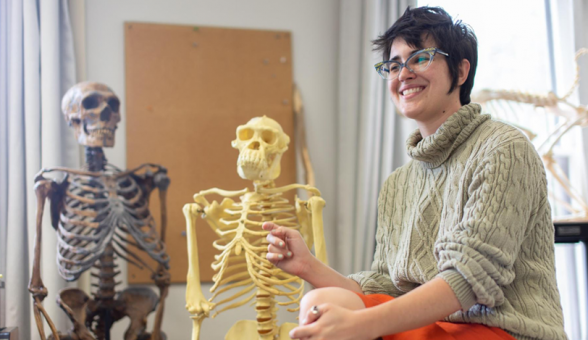
India Kotis

India Kotis
India Kotis (she, her, hers), a senior from New York City, answers questions about her career as an anthropology major at Kenyon.
The one and only Bruce Hardy.
I’m a history minor. They complement each other nicely, I think!
Affirmative. For the past several semesters, I’ve been a contributing editor at Lyceum, Kenyon’s science literary journal. That experience has been absolutely gobsmacking, and I encourage anyone who’s interested to join the magazine! I also wrote for the Spanish language newspaper, A Medio Camino, for about two years, and have a couple of on-campus (now off-campus) jobs which I love. One of them is as a research and editing intern for Daniel Mark Epstein, an associate scholar of the American studies department who’s editing a volume of the journals of Edna St. Vincent Millay. My job is to read Millay’s diaries, identify obscure historical or cultural references, and write footnotes about these references. I mean, what more could a girl ask for? (And I have to say, reading a brilliant stranger’s diaries is a fabulous antidote to loneliness.)
I’m a transfer student. Prior to coming to Kenyon, I was a film student at Columbia College Chicago. I always felt like something was missing at film school — I felt like people had a lot of ambition, but not much curiosity. Columbia also has a wonderful deaf studies program, and during the spring of my freshman year I took a course called "Deaf Culture," which remains one of the finest educational experiences I’ve had to this day. I realized that what drew me to filmmaking was not cinema, but people. The "culture" in "Deaf Culture" was definitely a harbinger of things to come. I switched majors, made the trek out to Gambier and have never looked back.
"Human Skeletal Analysis" was far and away my very favorite course. It offered not only an opportunity to learn about something I was really interested in, but it also involved a tactile method of learning, which was really interesting. It was always such a breath of fresh air to come study in the bone room at Palme after a day of heavy reading and writing.
I think a testament to this department is the number of courses I wish I wish I wish I had taken, but simply could not squeeze in: "Alcohol Culture," "Habitat and Humanity," "Anthropology of Religion, Science and Pseudoscience" and "Linguistic Anthropology" to name a few.
Go!
Be gentle with yourself. Take risks. Make friends with someone you disagree with. Go to office hours!
I will never live down not taking "Alcohol Culture."
I have to echo what Julia Louizides '20 said last week: Ed Schortman has made a profound impact on the way I see the world. His approach to human nature is so open-hearted.
Yes! Last summer I had an internship with the library, digitizing local antebellum and reconstruction era newspapers. It was a very mellow job, which allowed me room to pursue a couple of my own research projects on the side. I was also incredibly fortunate to intern in the Museum Education and Employment Program at the American Museum of Natural History in 2018. For the internship, I designed a 45-minute walking tour on human evolution that I gave to camp and school groups, and worked at the Sackler Lab for Human Evolution and Comparative Genomics, which is a mini educational lab in the museum focused exclusively on human evolution. Definitely a 10/10 experience.
If you had asked me two months ago, I would have said yes. The plan was to attend a bioarchaeological field school in Romania this summer (ossuaries! Medieval burials!), but now it is looking more and more as though that might not transpire. Right now I’m applying to lots of jobs and internships and bracing myself for the possibility of at-home orders persisting for several months longer.
A couple of years ago, I was lucky enough to compete in the Society for American Archaeology’s annual Ethics Bowl, a debate tournament about practical ethical conundrums in modern archaeology, with several other Kenyon anthropology students (now graduated). Professor Novotny was a skilled and graceful leader. It was such a rewarding experience. Not only did I bond with my teammates over months of preparation, but we also made it to the semifinals (!!!!) and I can say the process truly impacted the way that I think. I am more mindful and holistic in the way I approach things now, considering not only my intellectual imperatives but the way pursuing those imperatives might impact the people around me. It made me a better human.
Big asterisk, however: Every day at Palme house is a good day in my book.